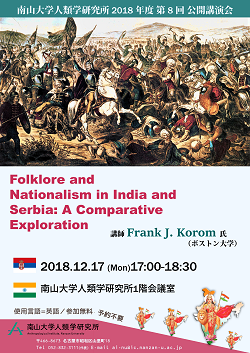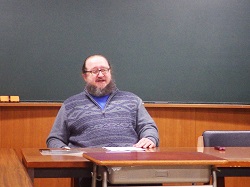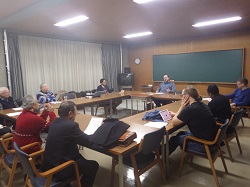研究活動 2016-2020年度
第8回公開講演会「Folklore and Nationalism in India and Serbia: A Comparative Exploration」実施
2018年12月17日
[日時]2018年12月17日(月)、17:00~18:30

|
[会場]南山大学人類学研究所1階会議室
[主催]南山大学人類学研究所
[講師]Frank J. Korom氏(ボストン大学教授、人類学研究所非常勤研究員)
[司会]ドーマン ベンジャミン(南山大学人類学研究所)
※使用言語は英語です。
[要旨]
Comparison, once the backbone of humanistic and social scientific research has been sidelined over the past few decades as more culturally relativistic methods have proven more dynamic for meaningful cultural analysis. Despite this, comparison seems to be making a comeback, since globalization and transnationalism demand it, due to deterritorialization, which has led to broader frameworks for studying the so-called "transnation." Some would argue that this push for borderless studies is symptomatic of postmodernity, but is the current age in which we are living so utterly different from the age of colonialism in which nationalist ideologies were being formulated in Europe? Indeed, calls for walls and fences are resurfacing in both Europe and North America as a result of deterritorialization. Thus, as a resurgence of nationalism takes place in many locations, we might want to rethink how we study similar phenomena in seemingly different contexts? What could be more different than India and Serbia? Good comparisons, I would argue, are based on significant differences, not just similarities.
[報告]
In the 8th public lecture of the Nanzan Anthropological Institute, Professor Frank J. Korom of Boston University gave a lecture on the topic of "Folklore and Nationalism in India and Serbia: A Comparative Exploration" followed by discussion with the participants. Professor Korom discussed how comparative research has been making somewhat of a comeback after the past few decades since globalization and transnationalism demand it, due to deterritorialization, which has led to broader frameworks for studying the so-called "transnation." He questioned whether the current age in which we are living is so different from the age of colonialism in which nationalist ideologies were being formulated in Europe, arguing that calls for walls and fences are resurfacing in both Europe and North America as a result of deterritorialization. In asking us to rethink how study similar phenomena in seemingly different contexts, he presented the seemingly different cases of India and Serbia, arguing that good comparisons are based on significant differences, not just similarities.
 |
 |
| Frank J. Korom氏 | 会場の様子 |